SUMMARY
This is AI generated summarization, which may have errors. For context, always refer to the full article.
![[Newsstand] The Angat Buhay NGO is not enough](https://www.rappler.com/tachyon/2022/07/angat-buhay-not-enough-july-5-2022.jpg)
True to her word, former vice president Leni Robredo launched the Angat Buhay non-government organization (under the registered name of Angat Pinas Inc.) on July 1, the day after she stepped down from office. And in keeping with her promise of continuity of service, the day before the launch she signed a contract with the Rotary Club of Makati, Southern Luzon State University, and the provincial government of Quezon to construct a dormitory for indigent students.
These twin events had all the Robredo hallmarks: prepared, innovative, calibrated, leveraging personal and institutional goodwill into an initiative that meets an actual need of a disadvantaged sector. And they help explain why the transformation of the massive “people’s campaign” that supported Robredo into what she hopes will be “the largest volunteer center in Philippine history” (as she said during her thanksgiving rally on May 13) is welcome, inspirational, necessary.
But the volunteer-led movement that coalesced around Robredo and her running mate, former senator Kiko Pangilinan, did not only promise the kind of leveraged initiative that improved people’s lives and that defined the work of the Office of the Vice President under Robredo; it also promised the kind of responsible, honest, and effective politics that Robredo and Pangilinan sought to practice.
In other words, the movement that supported Robredo and Pangilinan was also political.
In the beginning, the still-evolving movement conducted non-traditional activities, such as organizing “lugawan” or soup kitchens, to meet a traditionally political objective: Drafting Robredo to run for president. After she declared, the movement raised funds, hosted innovative events such as stationary caravans, posted tarpaulin streamers, distributed self-printed stickers and leaflets, created their own ads; in other words, the campaigners moved on, not always seamlessly, to a political campaign. After the first large rally in Quezon City, the possibility of larger events seized the imagination of the movement and – at least to this journalist – helped define it. Some of the largest election rallies in Philippine history punctuated the Robredo presidential campaign; if the total number of participants is added up, it may even be said that the campaign attracted the most number of supporters throughout a campaign. And all of that was ALSO political.
Political meaning
In my view, the political aspect of the Robredo movement is not about recognizing its potential, but recognizing its meaning.
Many of the supporters who campaigned for Robredo must have done so as a political act; they saw the chance to elect an extraordinary candidate, and did all they could to turn chance into outcome. To be sure, they were also part of the reason why the candidate was out of the ordinary; they made it possible for a viable candidate for the highest office to rely only on ordinary citizens for funds and resources. That had never happened before. Perhaps many supporters realized that; perhaps some didn’t. But their support, while it may have been rooted for some in other motivations, was decidedly political. They were making a political choice.
It is right there in the first part of the belated, hard-earned, but powerful slogan that electrified the campaign: Gobyernong Tapat, Angat Buhay Lahat. Even an idiomatic translation doesn’t do full justice to the theme: “Honest Government, A Better Life for All” is correct, but in truth, part of the power and appeal of the slogan was in the implied connection. “A government that is faithful to its duties leads to a better life for all.”
To transform the support of 15 million voters into a continuing movement, then, Robredo and her allies must recognize that part of the answer must be political.
And while the work of alleviating poverty and fighting disinformation, of lifting education standards and conducting disaster relief operations, is urgent and essential, the work of creating a responsible and responsive political culture is too.
Gobyernong Tapat Inc.
It is important, then, to organize the political equivalent of the Angat Buhay NGO. Call it Gobyernong Tapat Inc.
This organization will not be, and should not be, a political party. Given that many political parties supported the Robredo campaign, it should create a space for all these parties and other groups to meet in (like a clearinghouse), and raise a standard for them to rally behind (like a common front). And considering that many supporters, perhaps numbering in the thousands, found an affinity for and a willingness to do political work during the campaign, the organization should create the space and the opportunity for some of these volunteers to become fully employed political workers.
The organization will definitely not lack for issues to be heard on, or campaigns to run. Here are three real threats to the democratic project where a Gobyernong Tapat movement is urgently needed.
Leyte’s 1st District Representative Martin Romualdez, by all accounts the next speaker of the House, has proposed that the next barangay election be postponed again. The last barangay election was held in May 2018, after two postponements (2016 and 2017). The next one is scheduled for December 2022, after one postponement (2020, because of the onset of the pandemic).
Like other postponements, this attempt is being rationalized as a cost-saving measure, with the additional cover of being a pandemic response. But it only mocks the democratic necessity of regular elections at the most basic level of government, and turns the new administration into the largest patron of overstaying barangay officials. Imagined as an unusual public health response, the proposed postponement should be seen, and resisted, as unhealthy for Philippine democracy.
Pampanga 3rd District Representative Aurelio Gonzales Jr. has filed what is certain to be only the first of many bills seeking an amendment of the 1987 Constitution; in particular, he wants to lift term limits, on both members of Congress and the leaders of the Executive: the President and the Vice President (which, not so incidentally, he wants to belong to the same political party). This is essentially a refiling of a bill he filed only last January; we can expect more refilings, because in the 17th and 18th Congress, under the Duterte administration, there was a real drive to amend the Constitution.
That drive faltered under the weight of the old administration’s inability to keep party discipline and stay focused. It is best to assume, when considering the possibility of Charter change under the second Marcos administration, that discipline and focus will not be in short supply. A political movement that can engage the Charter change opponents on their own terms, but also generate a popular pushback, is urgently needed.
Senator Risa Hontiveros rightly takes the mantle of opposition leader, being the highest-ranking member of the movement to survive the Marcos-Duterte onslaught. (Now that Leila de Lima no longer holds office, I hope that Hontiveros can dedicate one of her staff members to look after De Lima in detention, full time.) But as both Robredo and Hontiveros know, part of the work of the political opposition must be to continue to organize. In this sense, this third threat is (using the SWOT framework) more in the nature of a weakness, an internal factor. It is a weakness of the opposition to think that, if they are not seen as doing political work, by attending for instance to the anti-poverty or disaster relief campaigns of Angat Buhay, they will not be demonized by the supporters of President Marcos and Vice President Duterte.
Whatever the opposition does or does not do, the demonization campaign will continue. Best to accept this as part of the new normal, and organize politically in earnest. – Rappler.com
Veteran journalist John Nery is a Rappler columnist, program anchor, and editorial consultant.
Add a comment
How does this make you feel?
![[Newsstand] State of the opposition: The fog of normalization](https://www.rappler.com/tachyon/2022/08/tl-opposition.jpg?resize=257%2C257&crop_strategy=attention)
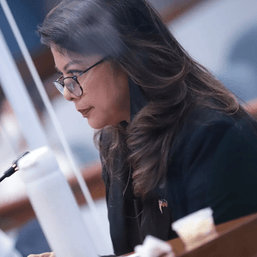

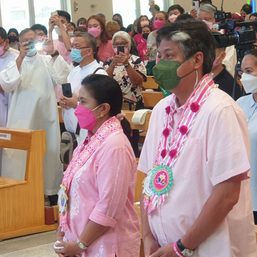
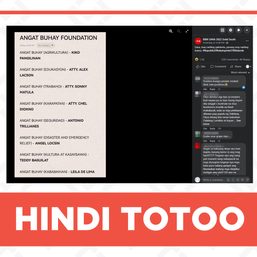
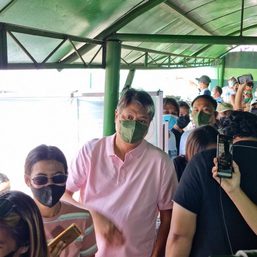
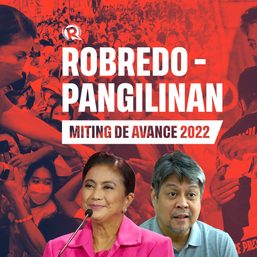
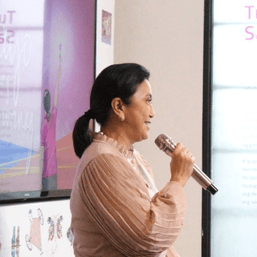

![[Newspoint] A fighting presence](https://www.rappler.com/tachyon/2024/07/thought-leaders-a-fighting-presence.jpg?resize=257%2C257&crop=441px%2C0px%2C1080px%2C1080px)
![[Closer Look] ‘Join Marcos, avert Duterte’ and the danger of expediency](https://www.rappler.com/tachyon/2024/06/TL-trillanes-duterte-expediency-june-29-2024.jpg?resize=257%2C257&crop_strategy=attention)

![[Good Business] Coalition of the willing](https://www.rappler.com/tachyon/2024/07/TL-Coalition-of-the-willing.jpg?resize=257%2C257&crop=423px%2C0px%2C1080px%2C1080px)



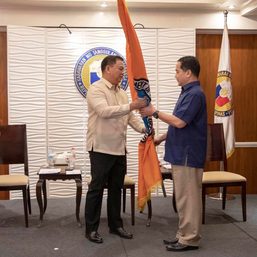
There are no comments yet. Add your comment to start the conversation.